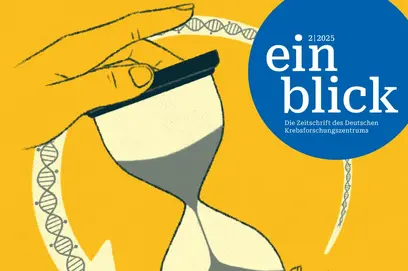Seit 1995 fördert das Bundesministerium für Bildung und Forschung (BMBF) die Genomforschung in Deutschland. Den Start machte das Deutsche Humangenomprojekt, das anschließend im Nationalen Genomforschungsnetz (NGFN) weitergeführt wurde. Nach Abschluss der ersten zwei Förderrunden wird die medizinische Genomforschung derzeit für zunächst drei Jahre mit 125 Millionen Euro durch das Programm „NGFN-Plus“ finanziert. Stefan Wiemann, kommissarischer Leiter der Abteilung Molekulare Genomanalyse im Deutschen Krebsforschungszentrum, wurde nun für zwei Jahre zum Sprecher des Netzes gewählt. Er übernimmt das Amt von Professor Martin Hrabé de Angelis vom Helmholtz Zentrum München.
Welche Ziele verfolgt NGFN-Plus? Stefan Wiemann erklärt: „Wir müssen verstehen, welche molekularen Vorgänge zu einer Erkrankung führen. Mit modernsten Technologien schaffen wir die Grundlagen, um zielgerichtete Medikamente zu entwickeln. Unsere NGFN-Projekte gehen daher heute weit über die reine Genanalyse hinaus und umfassen auch RNA, Proteine sowie Stoffwechsel- und Signalwege – um möglichst breit nach Ansatzpunkten für neue Behandlungsverfahren zu fahnden. Mit hoch spezialisierten Analysetechniken schafft das NGFN einen Mehrwert, der in isoliert arbeitenden Labors nicht erreicht werden kann. Nur so können wir in der internationalen Spitzenforschung mithalten und gleichzeitig neue Wege für den Einsatz in der Medizin eröffnen.“
Der Molekularbiologe Stefan Wiemann wechselte im Anschluss an seine Promotion im Deutschen Krebsforschungszentrum an das ebenfalls in Heidelberg ansässige Europäische Molekularbiologische Labor (EMBL), eines der weltweit führenden Zentren der automatisierten DNA-Sequenzierung. 1996 holte Professor Annemarie Poustka Stefan Wiemann zurück ans DKFZ, um dort im Rahmen des Deutschen Humangenomprojekts eine Bibliothek aller Gene des Menschen aufzubauen. Mit Kollegen aus dem EMBL entwickelte Wiemann eine Hochdurchatzmethode, um die Gene wieder in Zellen einzuschleusen, wo sie in Proteine übersetzt werden, deren Funktion innerhalb der Zelle die Molekularbiologen systematisch analysieren.
NGFN-Plus umfasst 26 „Integrierte Verbünde der Medizinischen Genomforschung“. Diese Verbünde, die sich in über 300 Projekten engagieren, arbeiten an einem umfassenden molekularen Verständnis von Krankheitsprozessen. Im Vordergrund steht die Erforschung von Krebs und neurodegenerativen Erkrankungen sowie von Herz-Kreislauf- und Infektionskrankheiten. Die wissenschaftlichen Ergebnisse sollen zur Entwicklung neuer Diagnose und Therapieverfahren für diese volkswirtschaftlich bedeutsamen Krankheiten beitragen. „Bei uns im Deutschen Krebsforschungszentrum steht natürlich die Suche nach zielgerichteten Medikamenten gegen bösartige Tumoren im Vordergrund“, erklärt Wiemann, „aber genauso dringend brauchen wir innovative Therapien gegen Volkskrankheiten wie Alzheimer, Diabetes und andere Leiden, die heute nur unzureichend behandelt werden können.“
Ein Bild von Stefan Wiemann steht im Internet zur Verfügung unter:
www.dkfz.de/de/presse/pressemitteilungen/2009/images/Wiemann.jpg
Über das DKFZ
Das Deutsche Krebsforschungszentrum (DKFZ) ist mit mehr als 3.000 Mitarbeiterinnen und Mitarbeitern die größte biomedizinische Forschungseinrichtung in Deutschland. Wissenschaftlerinnen und Wissenschaftler erforschen im DKFZ, wie Krebs entsteht, erfassen Krebsrisikofaktoren und suchen nach neuen Strategien, die verhindern, dass Menschen an Krebs erkranken. Sie entwickeln neue Methoden, mit denen Tumoren präziser diagnostiziert und Krebspatienten erfolgreicher behandelt werden können. Beim Krebsinformationsdienst (KID) des DKFZ erhalten Betroffene, Interessierte und Fachkreise individuelle Antworten auf alle Fragen zum Thema Krebs.
Um vielversprechende Ansätze aus der Krebsforschung in die Klinik zu übertragen und so die Chancen von Patientinnen und Patienten zu verbessern, betreibt das DKFZ gemeinsam mit exzellenten Universitätskliniken und Forschungseinrichtungen in ganz Deutschland Translationszentren:
- Nationales Centrum für Tumorerkrankungen (NCT, 6 Standorte)
- Deutsches Konsortium für Translationale Krebsforschung (DKTK, 8 Standorte)
- Hopp-Kindertumorzentrum (KiTZ) Heidelberg
- Helmholtz-Institut für translationale Onkologie (HI-TRON) Mainz – ein Helmholtz-Institut des DKFZ
- DKFZ-Hector Krebsinstitut an der Universitätsmedizin Mannheim
- Nationales Krebspräventionszentrum (gemeinsam mit der Deutschen Krebshilfe)
Das DKFZ wird zu 90 Prozent vom Bundesministerium für Forschung, Technologie und Raumfahrt und zu 10 Prozent vom Land Baden-Württemberg finanziert und ist Mitglied in der Helmholtz-Gemeinschaft Deutscher Forschungszentren.



